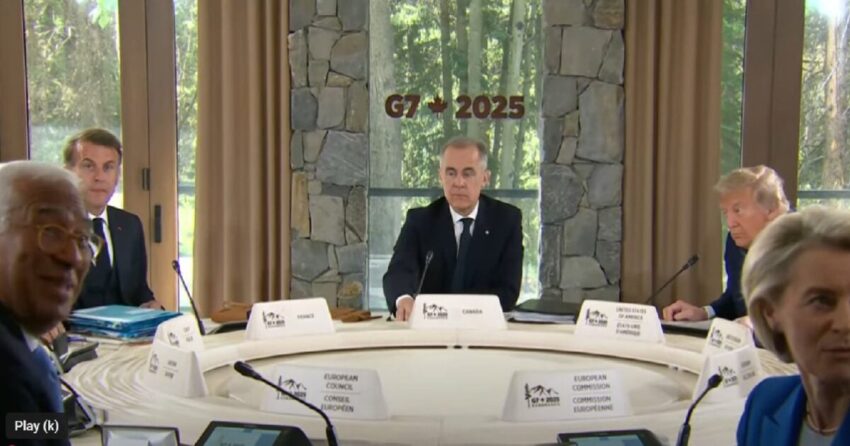
Commencing in 1975 as the Group of Six, then becoming the Group of Eight, now the Group of Seven (G7), assembled this week in Canada, with the G7 member designated as the 2025 “presidency.” The tradition at these global confabs is to discuss much, but to solve little or nothing. The stated goals year after year are essentially the same, even if the verbiage used varies. The gathering in Alberta this year, however, has been more interesting due to the President Donald Trump effect. Curiously, elected Canadian Prime Minister Mark Carney decided not to push for the usual written leaders’ communique as Mr. Trump is reluctant to put America’s signature on documents that don’t amount to much.
Collectivism often promotes the lowest common denominator, as is evident from years of pointless declarations emerging from these group meetings. Mr. Trump opted for productive bilateral conversations. Apart from their group membership, each of the other six countries is a trade or strategic partner of America, and there are issues to address.
Mr. Trump returned to Washington to get back to work and attend to Middle East conflagrations. He has made clear that Israel has the right to self-defense. He has consistently stated that Iran cannot obtain a nuclear weapon. This group of nations has had many opportunities to deal diplomatically with Iran’s nuclear ambitions, yet they have failed. Now that Israel has acted, the G7 is quick to put pen to paper. Under the leadership of Prime Minister Benjamin Netanyahu, Israel can move to contain the world’s largest state sponsor of terrorism without acquiescence from the G7.
Mr. Trump and Secretary of State Marco Rubio have made clear that “Iran should not target U.S. interests or personnel.” Mr. Trump has pledged peace through strength and no new wars. And this is indeed not a new war. The Islamic Revolutionary Guard Corps (IRGC) declared war on America, Israel, and the Persian people subsequent to the formation of the G6. The result of the current conflict will likely present a crevice for the people of Iran to reclaim their own fate.
The original G6 included France, West Germany, Japan, the United Kingdom, Italy, and America. Canada was added in 1976, and post-Soviet Russia joined in 1997. The initial mission of the group was to address economic and trade issues among the world’s largest economies. It quickly became a geopolitical forum focused more on wordsmithing documents to demonstrate globalized collaboration. By 2014, Russia was suspended due to its invasion of Crimea during the Obama Administration. It left the G8 permanently in 2017. Inexplicably, the European Union and the European Commission were given seats at the G7 table, furthering their bureaucratic nature, inability to solve conflicts, and contain rogue regimes.
The Group has not even served as a useful forum to address the economic and trade issues that were purported to be the incentive for its creation. As the world’s economies have grown and evolved, the Group of 20 (G20) was created in the wake of the global financial crisis in 1999. In line with most multilateral creations, it too has become the G20 plus others. Like garden weeds, the multilats expand quickly.
They could soon become parallel structures to the 800-pound gorilla of all bureaucracies, the United Nations. It is an organization that creates more issues than it solves at the expense of taxpayers around the world. And it is yet another body that has had ample opportunity through its many councils and forums to find diplomatic channels to address a potential nuclear Iran and, equally as terrifying, a possible nuclear North Korea. It will take some effort to recall who the parties were in the Six Party Talks and what happened there anyway.
In the meantime, great expectations of solutions from bodies such as the G7 should be very low. As the declaration drafters in Alberta debated whether to reiterate, reaffirm, or endorse the particular issue at hand, fortunately, there are greater forces at work taking concrete actions that will actually change, transform, and shape the future.
Manisha Singh is Principal at Sunstone Strategy Group and former Assistant Secretary for Economic and Business Affairs at the U.S. Department of State (2017-2021).
The views and opinions expressed in this commentary are those of the author and do not reflect the official position of the Daily Caller News Foundation.
All republished articles must include our logo, our reporter’s byline, and their DCNF affiliation. For any questions about our guidelines or partnering with us, please contact [email protected].
Click this link for the original source of this article.
Author: Manisha Singh
This content is courtesy of, and owned and copyrighted by, https://www.bizpacreview.com and its author. This content is made available by use of the public RSS feed offered by the host site and is used for educational purposes only. If you are the author or represent the host site and would like this content removed now and in the future, please contact USSANews.com using the email address in the Contact page found in the website menu.








